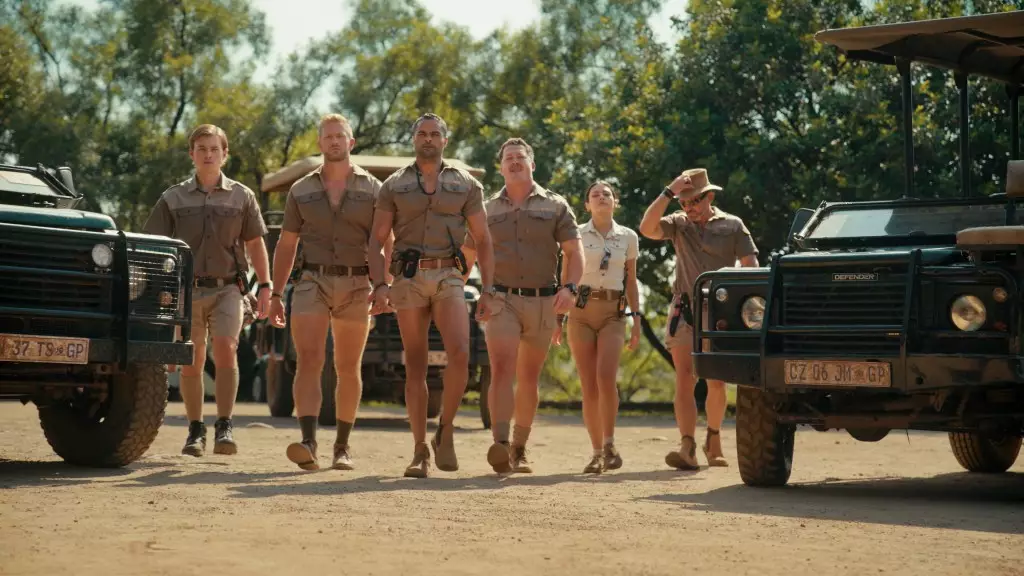In the realm of comedy, few films dare to break the mold as blatantly as *Khaki Fever*. This South African feature confronts cultural taboos head-on by exploring the audacious antics of game rangers engaged in a risqué competition, fundamentally flipping the traditional safari narrative. Instead of revering nature’s majesty, it celebrates the cheeky, rebellious undercurrent lurking beneath the bushveld’s tranquil veneer. Director Brett Michael Innes, known for his versatility and willingness to push boundaries, crafts a story that’s equal parts satire and social commentary, wrapped in a package of lively humor and provocative imagery. Rather than simply retelling a clichéd tale, Innes offers a lens into a side of the safari ecosystem that’s rarely depicted—one where testosterone, humor, and a desire for fame collide amid the wild landscapes of the Cradle of Humankind.
This film dares viewers to reconsider the archetype of the noble game ranger. Here, they are portrayed as larger-than-life characters indulging in their secret, bawdy pastimes—an ironic twist on the expected decorum of conservationists. By doing so, Innes challenges the sanitized narratives often associated with African safaris and introduces an authentic layer of human imperfection. It’s a reminder that beneath the poised exterior of wildlife protection, there are individuals eager to embrace their less-polished sides, especially when tipped with humor and hot-blooded mischief.
A Bold Response to Cultural Expectations
The film’s storyline hinges on a hilarious yet rebellious premise: a game lodge’s staff competing to attract the most tourists by engaging in flirtatious and risqué antics. Their goal? To see who can hook up with the most visitors over a season, all while dodging the lodge’s conservative manager who disapproves vehemently of their antics. The humor is rooted in its audacity—depicting rangers as reckless kings of their domain, with the title of “King of Khaki” up for grabs. This provocative setup isn’t merely superficial; it highlights a deeper commentary on South Africa’s social and cultural landscape, where rigid conservatism often clashes with youthful, liberating expressions of sexuality and humor.
Innes’s depiction of these characters is unapologetically candid, painting them as flawed but ultimately likable individuals who revel in their antics. The comedy plays on the tension between societal expectations and individual desires, prompting viewers to question what’s truly taboo. It’s an invitation to laugh at ourselves while recognizing the universal human need for freedom, fun, and connection—albeit in a decidedly unconventional setting.
Production, Cast, and Cultural Context
The film’s production shines through its high-energy visuals and a playful soundtrack composed by Loki Rothman, whose original theme song “Khaki Fever” fuels the narrative’s infectious spirit. Shot in both English and Afrikaans, *Khaki Fever* emphasizes its cultural authenticity and broad appeal across South Africa’s diverse linguistic landscape. The cast features a compelling mix of local talent, including seasoned actors like Christa Schamberger, Liam Bosman, and Ilse Klink, alongside prominent faces such as Christopher Jaftha and well-known South African entertainers such as Abel Knobel and Sean Brebnor. Their performances are characterized by a lively, exaggerated comic flair that echoes the film’s tongue-in-cheek tone.
Set at Zalisa Lodge, the film captures the breathtaking scenery of the Cradle of Humankind, providing a vibrant backdrop for its bawdy hijinks. This dramatic contrast between stunning natural beauty and risqué humor enhances the film’s satirical edge, highlighting the absurdity of human behavior amid nature’s grandeur. The movie’s premiere at the Silwerskerm Festival signals its significance within the regional cinematic landscape, positioning it as both entertainment and cultural critique.
Reinventing Comedy Through Cultural Authenticity
Director Brett Michael Innes’s previous works reveal an artist unafraid to explore diverse tones—from the poignant to the irreverent. With *Khaki Fever*, he boldly ventures into a territory that’s both hilarious and provocative, deliberately challenging the audience’s comfort zones. His approach reflects a broader trend in contemporary South African cinema: a willingness to confront societal hypocrisies with humor, without diluting the genuine local flavor.
This film is not simply about the scandalous antics of rangers; it’s about reclaiming space for humor that’s daring and unapologetic. It pushes the boundaries of what is acceptable in mainstream storytelling, embracing a raw, unfiltered look at human folly. Such boldness can be polarizing, yet it’s precisely what makes *Khaki Fever* a vital piece of contemporary cinema—one that refuses to shy away from the complexities of culture, class, and desire.
*Khaki Fever* is more than a comedic romp; it’s a visceral, unapologetic celebration of life’s wild, unpredictable moments. It dares to dissect cultural stereotypes with humor that’s as provocative as it is insightful—an antidote for a world that often prefers its stories sanitized and safe. If anything, it reminds us that even in the heart of the bushveld, there’s room for mischief, passion, and a little bit of chaos.

